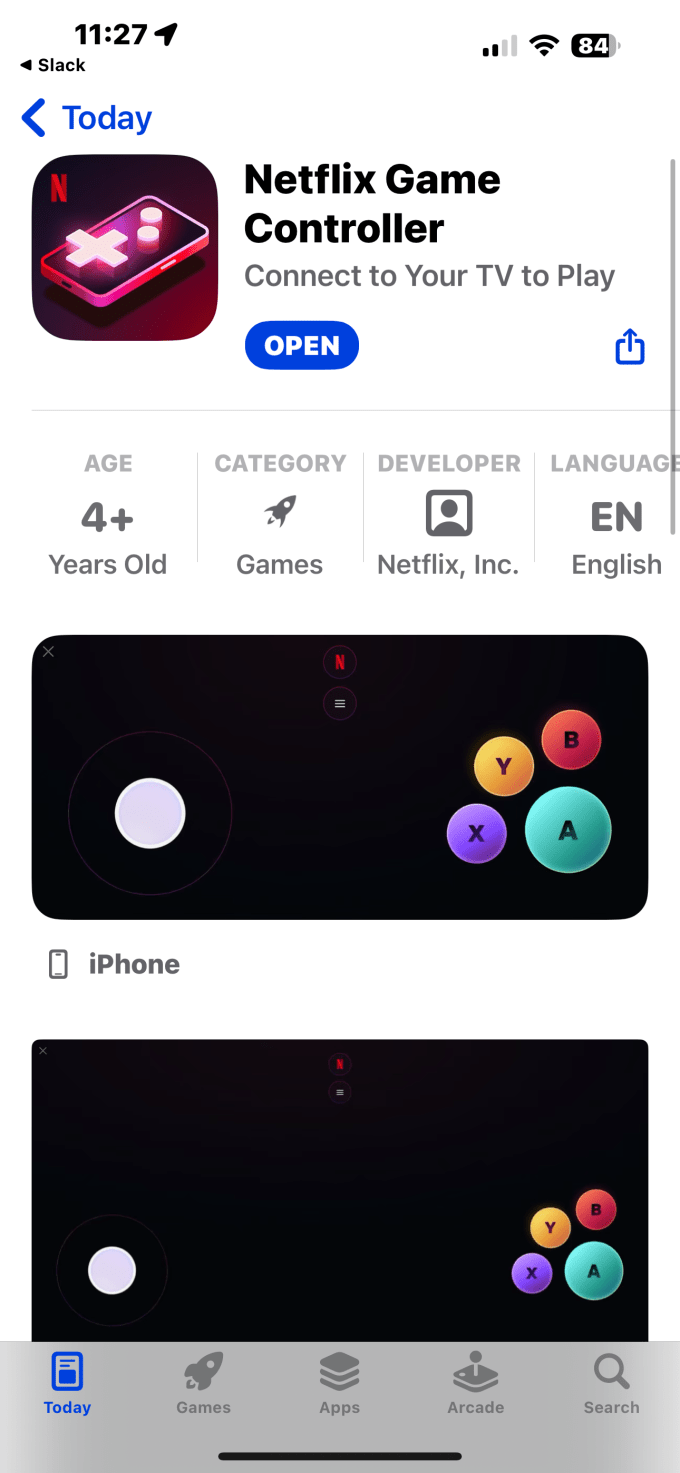After last fall signaling its intentions to expand into cloud gaming, Netflix today launched a new app that will soon allow subscribers to play games on their TV. The app, dubbed “Netflix Game Controller,” lets you use your phone as a controller after pairing it with your TV in order to play the games available through Netflix’s service.
Though the game has appeared in the App Store, there’s no news yet on which of Netflix’s games will be making their way to the big screen or when. Instead, the app’s description simply teases: “Coming soon to Netflix.”
Reached for comment, Netflix declined to share additional details about its plans or timeline.

Netflix’s new app on the App Store. Image Credits: Netflix
However, Netflix has already gone on the record about its plans to expand beyond mobile gaming.
In October 2022, Netflix VP of gaming Mike Verdu told the audience at our TechCrunch Disrupt event that Netflix was “exploring a cloud gaming offering.” He also noted the company would open a new gaming studio in Southern California, led by Chacko Sonny, the former executive producer on Overwatch at Blizzard Entertainment.
The exec clarified he didn’t see Netflix competing in the same space as PlayStation or Xbox, however.
“It’s a value add. We’re not asking you to subscribe as a console replacement,” Verdu said at the time. “It’s a completely different business model. The hope is over time that it just becomes this very natural way to play games wherever you are.”
While other cloud gaming services have failed, like Google’s Stadia, Netflix believes the issues were around the business models, not the technology. Verdu remarked that Stadia’s games were fun to play, but the business itself was not sustainable.
Netflix, on the other hand, bundles free games into the cost of its streaming subscription.
As Netflix continued to roll out more games to its service, Netflix’s VP of external games Leanne Loombe this May touted Netflix’s cloud gaming ambitions, saying, “We do believe that cloud gaming will enable us to provide that easy access to games on any screen. Our overall vision is that our members can play games on any Netflix device they have” — a statement that would clearly include users’ TVs.
The streamer also said around the same time that it had 40 games slated for launch this year as well as 16 being developed in its in-house studios plus 70 more in development with its partners. Since Netflix expanded into gaming in November 2021, it has released north of 50 titles.
Netflix was spotted developing an iPhone-based game controller this March.
The focus on Netflix gaming has been dwindling in recent months, as the market has been more concerned about how Netflix’s plans to crack down on password-sharing would impact its bottom line. In the last recent quarter, the streamer added 5.9 million global subscribers, bringing the total to 238.4 million — an indication the crackdown was working. But that also means there are more potential gamers for Netflix’s cloud gaming service, whenever it may arrive.
For the time being, the new Netflix Gaming Controller app is only available on iOS. Because it’s so new to arrive, market intelligence firm data.ai doesn’t yet have it listed under Netflix’s apps and games on its service or have information on rankings.
Powered by WPeMatico



